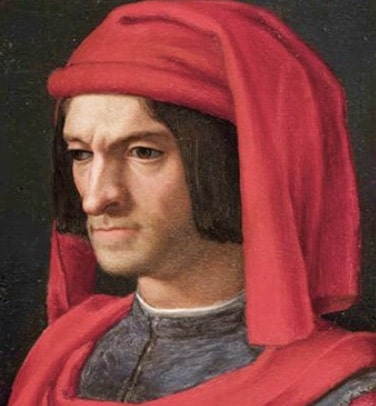
Lorenzo de’ Medici, who would become known as Lorenzo the Magnificent (Italian: Lorenzo il Magnifico), was born on January 1, 1449. He was the grandson of Cosimo de’ Medici, who had established the family as one of the wealthiest and most influential in Florence. During his early years,, Lorenzo was tutored by bishop, Gentile de’ Becchi and the philosopher Marsilio Ficino. He was also tutored in ancient Greek, providing him with access to classical literature.. Lorenzo and his brother Giuliano were trained in falconry, jousting and horse breeding. Following the death of his father, Piero de’ Medici, Lorenzo became the de facto ruler of Florence in 1469 at the age of 20.
A skilled diplomat, politician, and patron of the arts, Lorenzo maintained Florence’s stability and power through strategic alliances with other Italian city-states and European monarchs. His diplomatic acumen helped maintain the delicate balance of power in Italy during a tumultuous period.
Beyond his political prowess, Lorenzo was a passionate supporter of the arts and humanities. He fostered an environment that nurtured some of the greatest artists, writers, and philosophers of the Renaissance. Lorenzo patronized renowned figures like Botticelli, Leonardo da Vinci, and Michelangelo, contributing significantly to the flourishing cultural and intellectual atmosphere of Florence. He was also a poet and wrote several sonnets and other works, demonstrating his literary talents and his deep appreciation for the arts.
In 1471, Lorenzo estimated that his family had contributed a substantial portion of their wealth to charity and patronage of the arts (equivalent of $US 460 million in today’s dollars) but expressed no regrets, stating:
I do not regret this for though many would consider it better to have a part of that sum in their purse, I consider it to have been a great honour to our state, and I think the money was well-expended and I am well-pleased.
In spite of his benevolent leadership,, Lorenzo’s rule faced challenges, including political tensions within Florence and external threats. His later years were marked by conflicts, including the Pazzi conspiracy in 1478, that resulted in an assassination attempt on Lorenzo in which Lorenzo was wounded and his brother Giuliano was killed.
Lorenzo de’ Medici died on April 9, 1492, at 43 years of age, from what some researchers believe may have been acromegaly, a rare condition caused by excessive secretion of the growth hormone by the pituitary gland. He had been a a key figure in the unfolding of the Renaissance through his role as a patron of art and culture. It was his contribution to Florence’s political stability and cultural flourishing that earned him the epithet “the Magnificent,” and he continues to be a celebrated figure in the history of Italy and the Renaissance.
